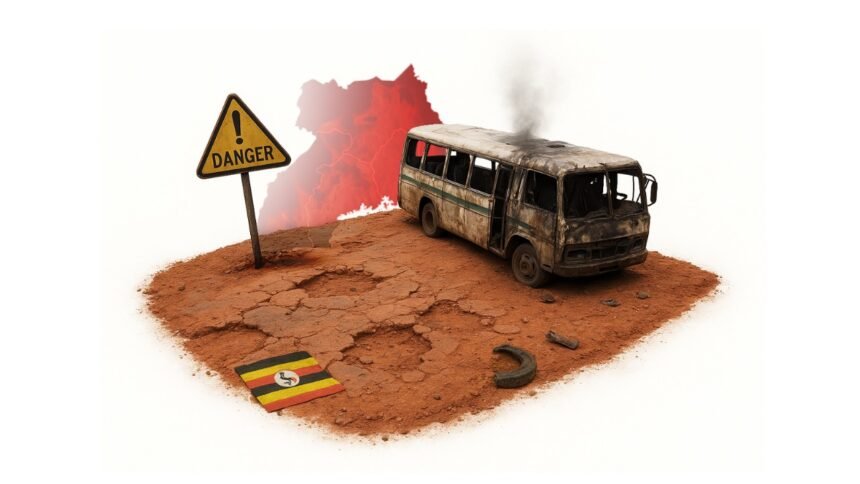Uganda woke up to heartbreak this morning. A crowded bus traveling from Kampala to Gulu veered off the road late last night, killing at least 27 passengers and injuring dozens more. The accident, which occurred near Luweero District, is the latest in a string of fatal crashes on Uganda’s deteriorating highways — and it raises the same old question: why are East Africa’s roads still claiming so many lives?
Witnesses said the bus, owned by a private transport company, was speeding before it lost control on a sharp bend. It rolled several times before bursting into flames, trapping passengers inside. Local police confirmed that 15 people died on the spot, while others succumbed to their injuries at the hospital. “We have lost entire families,” said a traffic officer on the scene. “It is devastating to see the same mistakes happening again and again.”
For years, Ugandan authorities have vowed to improve road safety. Yet the grim statistics keep rising. According to the Ministry of Works and Transport, Uganda records more than 12,000 serious road crashes each year, claiming around 3,500 lives — one of the highest rates in sub-Saharan Africa. Experts blame reckless driving, overloading, poor vehicle maintenance, and crumbling roads for most fatalities. But beneath all that lies something darker: indifference.
On Ugandan highways, danger isn’t the exception — it’s the default. The long, winding routes connecting cities and towns are riddled with potholes big enough to swallow a tire. Drivers navigate them like landmines, often swerving into oncoming lanes to avoid damage. Night travel only makes things worse. Buses packed with passengers race against time, with drivers pushing through exhaustion and bad weather to meet schedules or collect extra fares.
In this case, survivors say the driver ignored warnings from passengers to slow down. “We told him several times the road was slippery,” said one survivor. “He just laughed and said he knew the way better than us.” That arrogance — a mix of overconfidence and desperation — has become an all-too-familiar killer on Uganda’s roads.
The government, for its part, blames “human error.” But critics argue that shifting all responsibility onto drivers hides a bigger failure — the collapse of road infrastructure and the lack of enforcement. Many roads are poorly lit, lack guardrails, and see little to no police monitoring. Corruption doesn’t help either. Transport operators routinely bribe officials to skip vehicle inspections, while overloaded buses roll past checkpoints unchecked.
The aftermath of this crash has reignited calls for reform. Civil society groups and road safety advocates are demanding that night bus travel be temporarily suspended. Others are urging President Yoweri Museveni’s administration to declare road safety a national emergency. “We lose more people on our highways than to any disease outbreak,” said one activist. “But the response is silence.”
The tragedy also highlights broader regional issues. Across East Africa, from Kenya to Tanzania, road accidents remain among the leading causes of death. Despite massive investments in highways and flyovers, enforcement and driver training lag far behind. A culture of speeding and cutting corners undermines every new project. In Uganda, where public transport is largely privatized, competition for passengers pushes companies to prioritize profits over safety.
In the villages along the crash site, grief and anger mingle. Families search through the wreckage for missing loved ones. The air smells of burned metal and diesel. “We’ve been crying for better roads for years,” said a local elder, shaking his head. “They come to cut ribbons when a new road opens, but they never come when people die.”
Online, Ugandans are venting frustration. Social media is flooded with photos of twisted metal and condolence posts. “Another bus, another graveyard,” one user wrote bitterly. The phrase has become grim shorthand for a national crisis that feels both inevitable and ignored.
The victims’ names will fade, replaced by new ones when the next bus overturns on the next bad road. Unless Uganda changes how it views road safety — not as a traffic issue, but as a national priority — the headlines will keep repeating themselves.
For now, Luweero mourns its dead. The families will bury their loved ones under the red soil that has seen too many funerals. And on Uganda’s roads, buses will keep roaring into the night — fast, full, and fragile.










